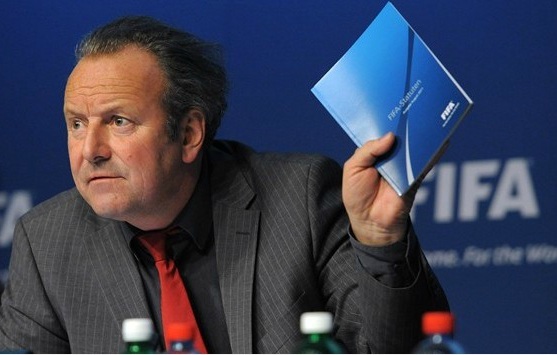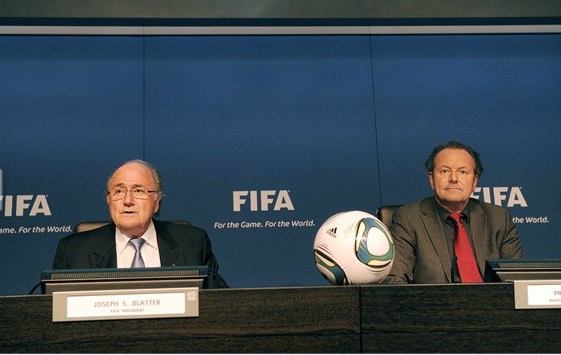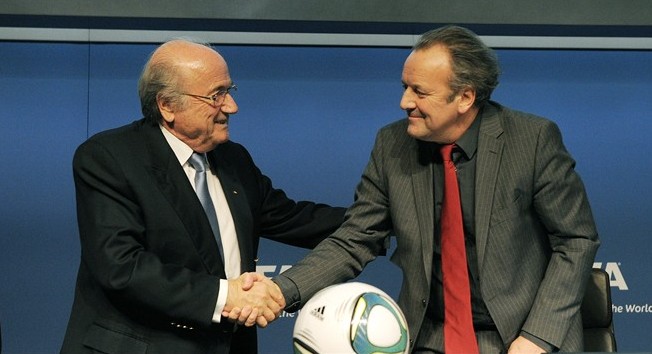By Andrew Warshaw
November 30 – The Swiss academic charged with cleaning up FIFA has recommended limited terms for the organisation’s inner sanctum – including the President (pictured left) – and far more scrutiny when it comes to screening key decision makers.
But Professor Mark Pieth (pictured right) says it would be “professionally unsound” to heap further discredit on those who have brought FIFA to its knees with a series of bribery-tainted scandals in the past year.
Just over a month after FIFA President Sepp Blatter presented his so-called “road map to reform” with a series of new anti-corruption bodies, Pieth was introduced to the world’s media today as the man given chief responsibility for putting the organisation back on its feet.
Chairman of what has become known as FIFA’s new Solutions Committee, Pieth, introduced personally by Blatter, presented a detailed 40-page Governing FIFA report which, he promised, was only the beginning in terms of “bringing FIFA back on the road of virtue”.
Pieth will chair a multi-stakeholder group of experts with backgrounds in law, sports, marketing and governance, the identities of whom will be announced on December 17 at FIFA’s Executive Committee meeting in Tokyo.
The so-called Independent Governance Committee will be in charge of working on concrete proposals to improve FIFA’s governance and transparency, and will receive reports from four separate Task Forces.

Outlining the scope of his work ahead, some of the information Pieth presented was academic-speak that had little direct relevance to the nitty-gritty of FIFA’s scandal-hit year.
Not surprising really since for the past 21 years, he has been involved in advising on business and political corruption rather than sport.
When asked whether he would revisit FIFA’s shady past as well as shape the future, he replied: “It would be professionally unsound to do both at the same time.”
Yet there were one or two telling observations in terms of forcing FIFA to change its ways.
One key recommendation will be to limit the mandates of the FIFA President and the entire Executive Committee.
Another was making sure any officials with a serious criminal record are excluded from FIFA’s inner sanctum.
“We have come up with totally independent views,” said Pieth who acknowledged there was a considerable conflict of interest issue within FIFA and too much overlapping.
“Not all of the report will make everybody happy.
“The statutory bodies will not like everything we are putting on the table.
“There are due diligence requirements we are suggesting especially for the executive committee.
“It’s a hot topic.”
Limiting terms of office, he said, was critical to stop the kind of sordid cliques that have become de rigueur within FIFA.
Or, as Pieth put it, “to ensure that people do not build up too big allegiances that make them inactive and no longer critical”.
He went even further in his actual report warning that World Cup bidding in the current format was “actually a mix of corruption risk and conflict of interest concerns”.
“Suspicion that individuals either sold their vote or profiteered directly from the choice of venue is combined with allegations of a strategic use of development money in order to influence decision-takers of ExCo,” the report said.

Last December’s votes for the 2018 and 2022 World Cups was mired in collusion allegations with two FIFA members banned for breaching ethics committee rules.
Pieth said the bidding process should be revamped to prevent manipulation.
He described the recent decision to let the FIFA Congress, rather than the all-powerful elite Executive Committee, to take the final vote on World Cup hosts as “a step in the right direction from a corruption prevention perspective”.
Whilst his appointment is bound to be viewed with a certain amount of scepticism, Pieth, a professor in criminal law, said he was determined for his panel to have teeth and would walk away if it does not.
“I admit I am running a certain risk but in order to make a difference, we have to be convincing,” he said.
“We are talking about serious stuff here.
“We are trying to change something, but of course there’s a bottom line; if we are seriously unhappy I can say ‘this is it, I’ve had it’.”
Contact the writer of this story at zib.l1745120734labto1745120734ofdlr1745120734owedi1745120734sni@w1745120734ahsra1745120734w.wer1745120734dna1745120734
Related stories
November 2011: Anti-corruption guru Mark Pieth to lead FIFA reforms

